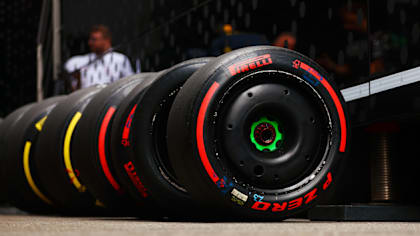
Feature
DESTINATION GUIDE: What fans can eat, see and do when they visit Baku for the Azerbaijan Grand Prix
Share

Baku is a city of two halves. Affectionately nicknamed the ‘City of Winds’, this modern, forward-thinking metropolis, capital of Azerbaijan, sits on the shores of the Caspian Sea (the world’s largest inland body of water).
It is criss-crossed with rich history that would perhaps ordinarily sit at odds with the contemporary elegance the city exudes, but instead the past is woven through every aspect of life here with ease.
Nowhere else on the F1 calendar can boast a track that butts up (literally) to UNESCO protected Medieval walls as the drivers navigate the challenging streets of this intriguing city circuit. Here, the slightest mistakes are punished quickly and severely thanks in no small part to the proximity of those aforementioned walls.
Where and what to eat
Azerbaijan sits snugly on the boundary between Eastern Europe and Western Asia, and unsurprisingly displays a culinary heritage heavily influenced by its neighbours Georgia, Russia, Armenia and Iran, with the food of nearby Turkey also featuring on menus in the Azerbaijani capital.
Located in bustling Fountains Square in the heart of the city is Firuze, a subterranean restaurant situated in a former cellar. It is popular for its traditional menu featuring dolmas, pilafs (plovs), bubbling hotpots and impressively presented kebabs, surrounded by charming decor with handcrafted carpets, wall hangings and a warm and welcoming atmosphere.
Just around the corner is Araz Cafe, a Baku staple since its opening in 1953 and a favourite of older Bakuvians – being a familiar haunt for many of them during the Soviet era. Focusing almost entirely on Azeri cuisine, the authentic interior is the perfect backdrop for sampling inexpensive local fayre, such as qutubs (stuffed pancakes), with efficient yet friendly service.
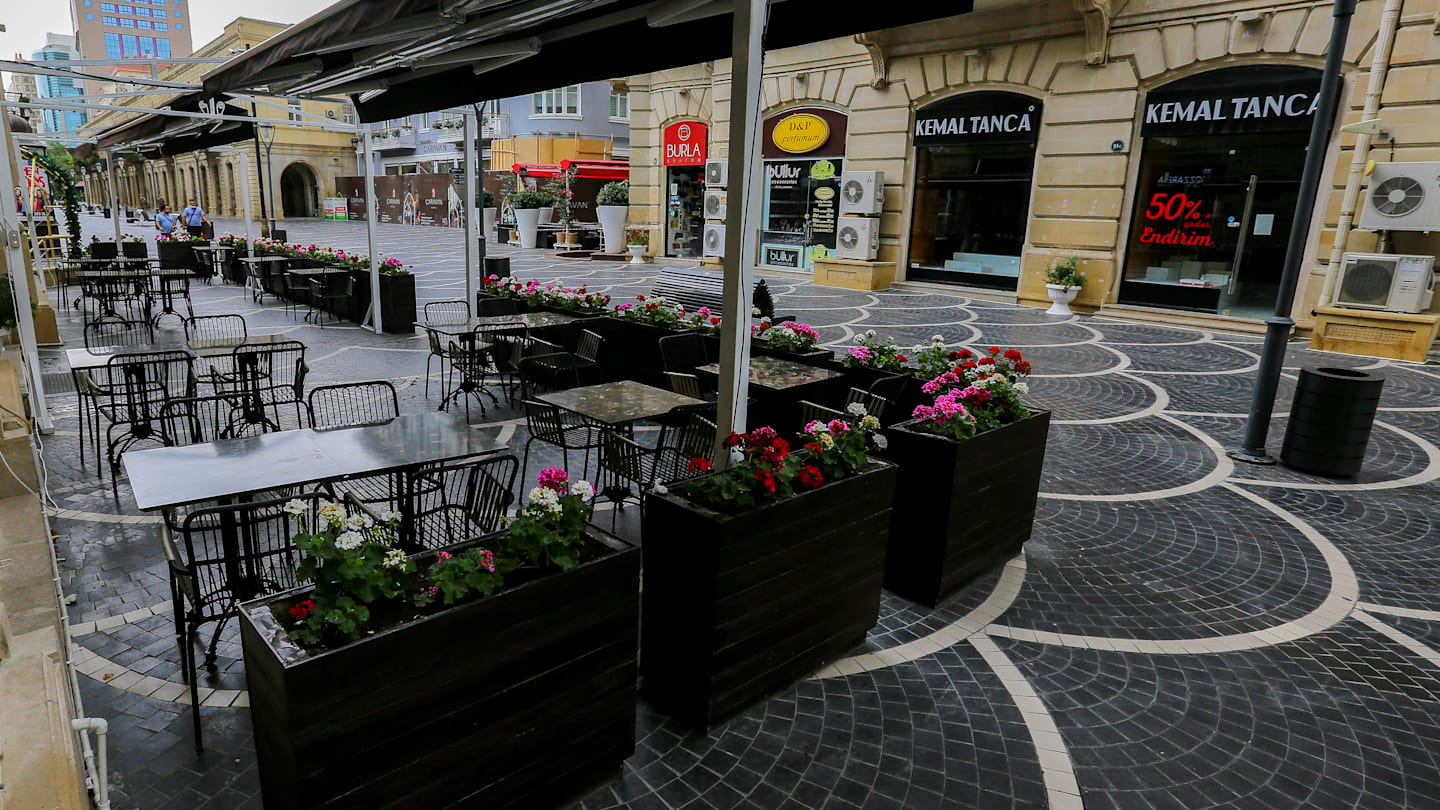
There are plenty of places to eat at when you visit Baku
Tucked away in a quieter part of the old town is Art Club Restaurant, an elegant and beautifully decorated eatery housed in a restored 18th century townhouse with a boutique hotel next door.
Situated away from the tourist crowds, it’s the perfect place to enjoy some calm and restorative respite, not to mention delicious food, with a highlight being the selection of plovs (pilafs). Some estimates put the number of different Azeri plovs at around 200, but of these the ‘shakh plov’ or ‘crown pilaf’, which is traditionally served on special occasions, is the most revered.
This show-stopping king of dishes resembling a large pie is created by encasing various combinations of rice, meat, dried fruits and nuts in a round crust of levash, a thin flatbread, before baking it until crisp and golden brown. The plov is then cut into portions to reveal the fragrant filling and is washed down with a glass of local Azerbaijani wine of which the Art Club Restaurant has a wide selection.
READ MORE: Everything you need to know about F1 – Drivers, teams, cars, circuits and more
Boasting an interior apparently reminiscent of your ‘Grandmother’s apartment’ (if your Grandmother was partial to chandeliers, lacquered panels, tapestries, upholstered armchairs and opulent cabinetry filled with jars of ferments and pickles), Mari Vanna is a Russian restaurant located close to the F1 paddock. It oozes Soviet-era nostalgia served up alongside a menu of Russian home-cooking, with family favourites such as dumplings stuffed with potatoes and mushrooms, and an excellent borscht that your Grandmother would be proud of.
Hungry and running short of time but wanting to soak up as much Azeri culture as possible? Then head to Shirvanshah Museum Restaurant, Baku’s most experiential dining destination which, as the name suggests, doubles as a museum.
This enormous eatery is a labyrinth of rooms and corridors, at the heart of which is a converted Medieval hammam. Each room has its own unique theme, and you can expect to be taken on a journey through the city’s recent history whilst sampling the very best of Azerbaijani cuisine.
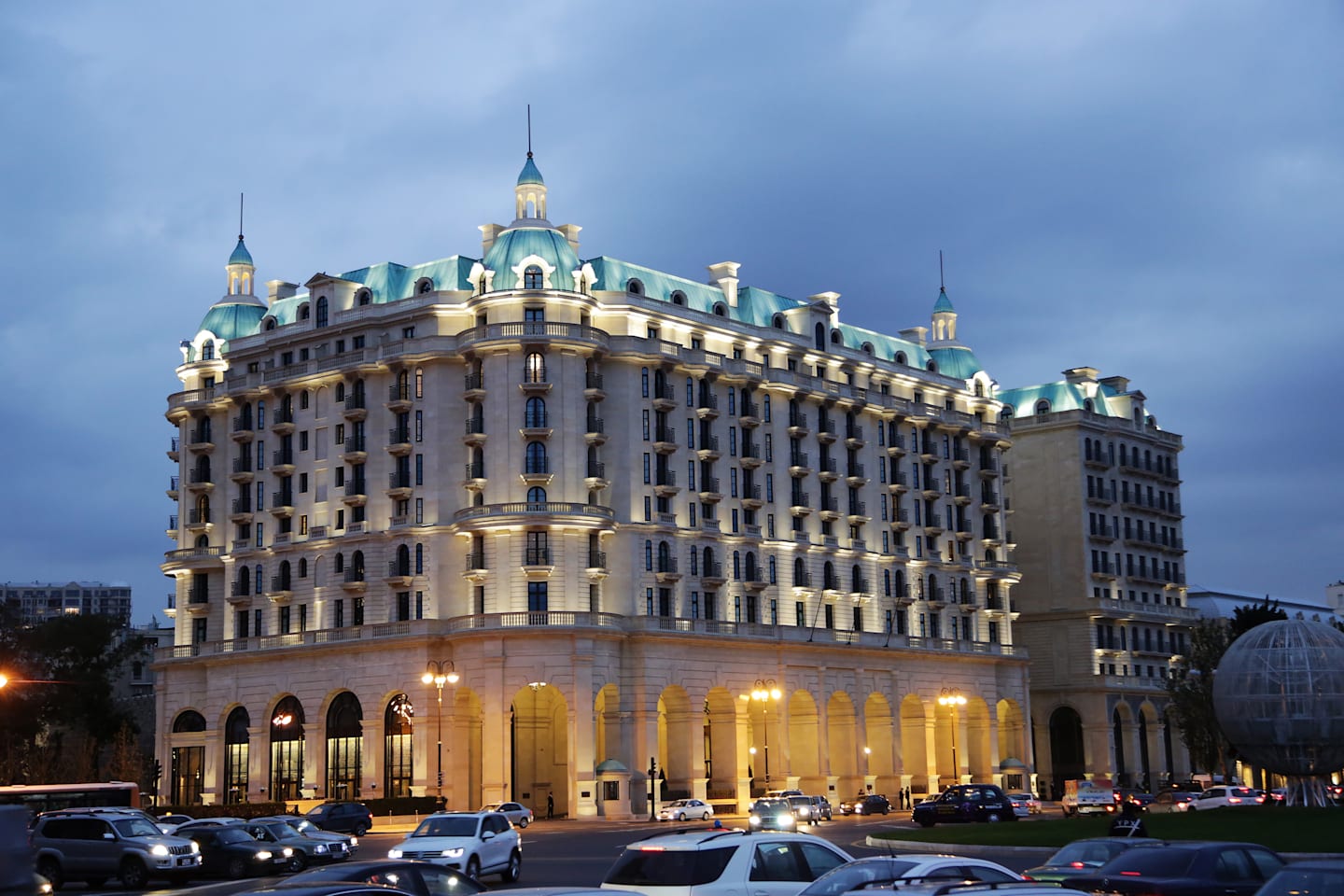
Baku has a wide range of accommodation where fans can stay over the race weekend
Perched high on the 25th floor of the Hilton Hotel, the rotating 360 Bar offers unparalleled views of the twinkling lights of Baku by night and is the perfect spot to enjoy pre-dinner cocktails and canapes such as olives stuffed with local caviar from sturgeon caught in the sparkling Caspian Sea below.
For something more down to earth, dotted around the city are small characterful pubs and bars serving inexpensive local beer and bar snacks.
Where to stay
Baku has a wide range of accommodation to suit every traveller’s budget, from the usual big name chain hotels located in the heart of the city, to smaller boutique establishments situated in and around the old town.
READ MORE: The beginner’s guide to the F1 weekend
Where to watch the race
The Absheron grandstand at the end of the main straight offers excellent views of the cars braking from around 350kp/h into the 90 degree Turn 1. Alternatively, the Icheri Sheher grandstand provides a unique vantage point of the wriggly city gate section, before the cars turn up the power for the fast Turn 13-15 complex.
Non-F1 highlights
Baku is brimming with both historic and contemporary architecture and culture, making it a truly fascinating city to explore. The walled old city - or Icheri Sheher (inner city) - was founded on a site inhabited since the Palaeolithic period and is incredibly well preserved.
Stroll around the maze of narrow streets within the old walls, with its limestone houses, some with intricate and distinctive wooden balconies, and soak up the atmosphere of this historic and architecturally unique area of the city.
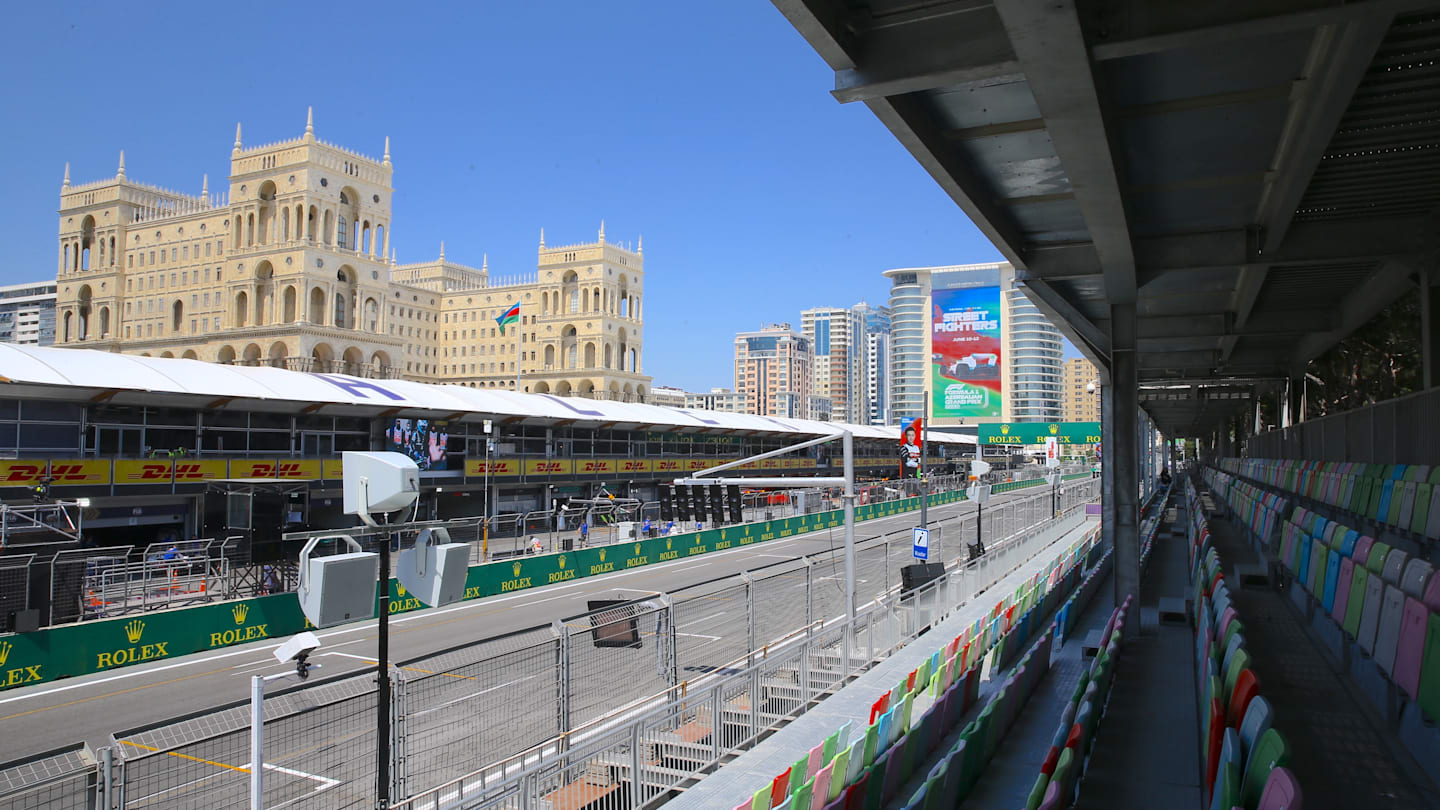
Fans can get a great view of the cars braking into Turn 1
Visit the Palace of the Shirvanshahs – built in the 15th century and described by UNESCO as ‘one of the pearls of Azerbaijan’s architecture’. Home to the once ruling Shirvanshah dynasty, and serving as a royal residence for 200 years, the sprawling complex contains a palace, burial vaults, mosque, a mausoleum and the remnants of a bath house, and has by far some of the best views in the city.
A world away from the old city in every sense, the strikingly bold and distinctive architecture of the Heydar Aliyev Cultural Centre, designed by the late Iraqi-British design architect Zaha Hadid, is one of the best representations of forward-facing Baku.
READ MORE: The beginner’s guide to the F1 calendar
The sinuous curves of this design award-winning building hosts a variety of exhibitions within, documenting Baku’s journey from ancient, fortified city to the modern and elegant capital it is today. There is even a museum devoted to the display of old and rare cars in the basement.
If this has whetted your cultural appetite, then Baku has not one but two unique museums well worth a visit. Not far from the Palace of the Shirvanshahs and housed in an elegant building, the Museum of Miniature Books stores around 8,000 tiny, printed publications from 76 countries that could all fit in the palm of your hand.
In fact, the world’s smallest book resides in the collection here, and measuring just 2x2mm means that the text can only be read with the help of a very strong magnifying glass.
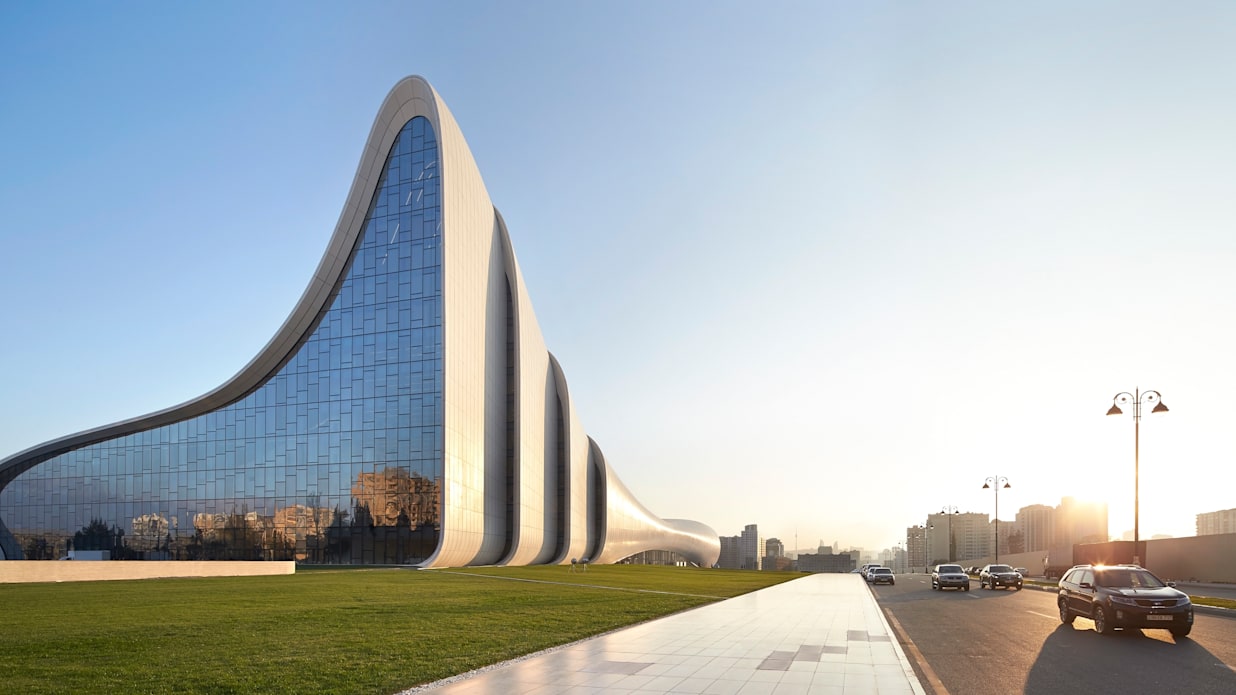
Fans can also visit the Heydar Alijev Cultural Centre
If you prefer textiles to miniscule sheets of bound paper, then the Azerbaijan National Carpet Museum is for you – not least because the building itself resembles a giant rolled up carpet, but at the time of establishment was the only museum dedicated to the noble Azeri art of carpet weaving, housing many ancient specimens and the largest collection of Azerbaijani carpets in the world.
Hugging the coastline of the Caspian Sea, the Baku Boulevard stretches nearly 3.75km and is perfect for a relaxing stroll along the waterfront. This coastal promenade starts at National Flag Square, and is home to an amusement park, cafes and bars, the Baku Ferris Wheel and Mini-Venice.
READ MORE: How sustainable fuels can benefit the world – and are more than just the future of F1
Opened in the 1960s, this curious area of artificial canals peppered with islands connected by bridges may be a small approximation of the real thing, but for a few manats you can ride the local version of a gondola through the waterways. The omnipresent trio of the Flame Towers, with their ever-changing LED displays, can also be viewed perfectly from this seaside vantage point.
Fun fact
Built in the 12th century, the iconic Maiden Tower situated within the walls of the old city is a bit of a mystery. To this day, nobody knows for sure why the tower was constructed and what its purpose may have been, and many theories and legends abound, influencing Azerbaijani poems, ballets and plays over the years.
One of the more common legendary tales features a king who wanted to marry his daughter off to a man she didn’t love. The daughter manages to stall proceedings by asking her father to build her a tower first which she hopes will never be completed, but sadly for her the tower is finished and, in despair, she takes her own life by throwing herself off the top of it and her body is washed away into the Caspian Sea.
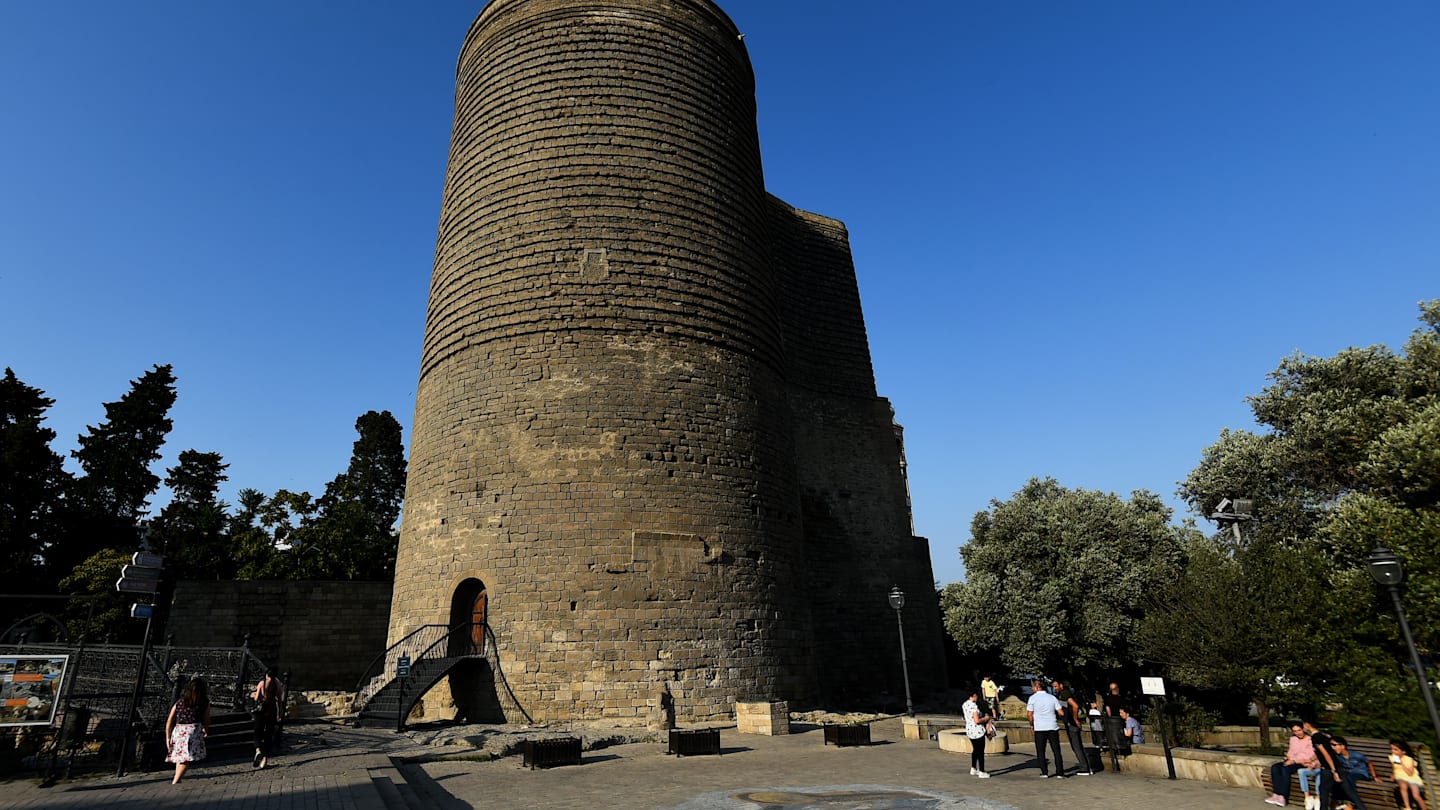
To this day nobody knows for sure why the Maiden Tower was constructed
Baku sits firmly at the crossroads of East and West and bears the architectural legacy of all those who ruled her, from the fortified old city of the medieval Shirvanshah reign to the rigid, yet opulent, 19th century Soviet-era designed buildings.
But the city hasn’t rested on its historic laurels, and today’s Baku is very much a forward-facing centre for modern culture, whilst still regularly glancing over its shoulder to its past.
Azerbaijan at a glance
- Currency: Azerbaijani Manat
- Language: Azerbaijani
- Population: Approx. 10.6m
- First F1 race: 2016

RACE TICKETS - AZERBAIJAN GP
Don't miss your chance to experience the epic Baku City Circuit...
Share
YOU MIGHT ALSO LIKE
Feature SAO PAULO GRAND PRIX – Read the all-new digital race programme here
News What tyres will the teams and drivers have for the 2024 Sao Paulo Grand Prix?
News 'We never expected it' – Komatsu says securing P6 in his first season as Haas boss would ‘mean everything’
News Alonso to miss media day in Sao Paulo after receiving medical treatment


